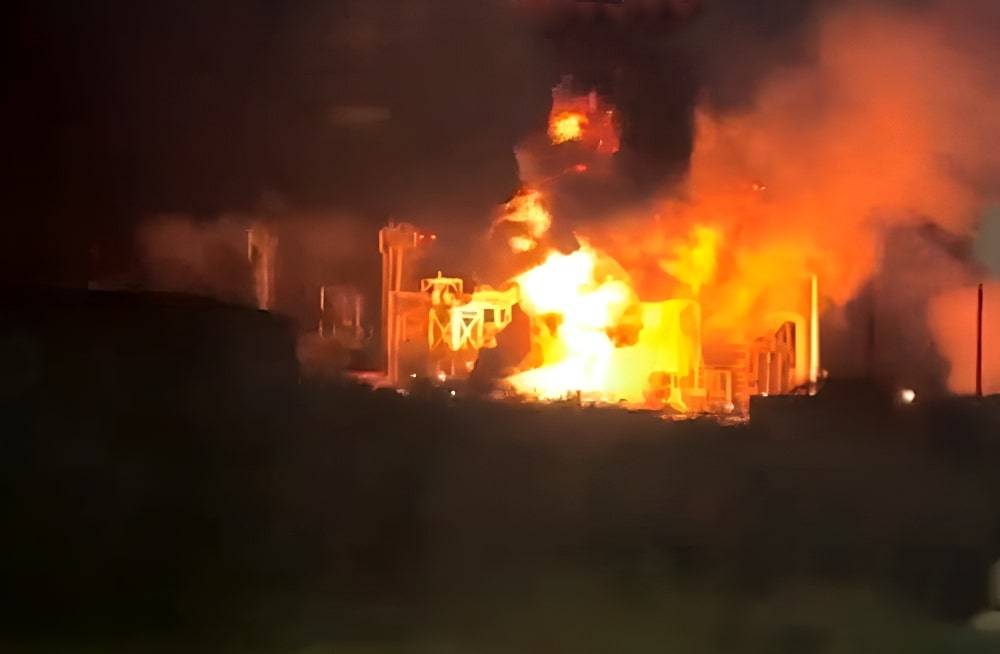The Ukrainians are effective at striking at the weak spots of Russia, which has so far evaded Western sanctions. If anyone is afraid of the consequences of their strikes on Russian refineries, they should tighten sanctions. Here’s how to do it – writes Wojciech Jakóbik, editor-in-chief at BiznesAlert.pl.
- Oil production in Russia fell by 7 percent due to Ukraine’s drone attacks. Ukraine also attacked the fuel terminal in Ust-Luga and numerous fuel depots. Attacks of this kind undermine the logistics of fuel supply, which is important from the point of view of military operations and the economy.
- The US administration called on Ukraine to stop attacking Russian refineries for fear of rising fuel prices at American gas stations before the presidential elections in the fall of 2024.
- If the Ukrainians do not need to strike at Russian refineries, they will focus on other forms of self-defense against the invading forces. The sanctions, which so far have been insufficient, should therefore be tightened.
- This blow will prevent the development of the LNG sector and raise the labor costs in the oil sector.
Ukraine continues drone strikes
The wave of Ukrainian drone attacks on Russian refineries continues. According to Reuters, the list, which was compiled in the form of a popular bingo sheet on social media, already includes the Kuybyshev refinery (1.34 percent of oil refining in Russia), Ryazan (5.8 percent), Novoshakhtinsk, Norsi (5.8 percent), Kirishi (6.4 percent), Syzran (2.2 percent), Slavyansk and Kaluga. Reuters estimates that Russia’s oil production fell 7 percent in the wake of Ukraine’s drone strikes. Ukraine also attacked the fuel terminal in Ust-Luga and numerous fuel depots. Attacks of this kind undermine the logistics of fuel supply, which is important from the point of view of military operations and the economy. They limit the Kremlin’s revenues from the sale of finished fuels and paralyze the railway infrastructure, which has to spend more time on relocating these goods to places where they are missing. Wholesale fuel prices at stations in Russia have risen by almost 30 percent since the New Year, raising the risk of a return to the fuel crisis despite an embargo on gasoline that has been in force since March, which may also be followed by an embargo on diesel and LPG.
Ukraine’s drone strikes work
The Financial Times has suggested that the US administration called on Ukraine to stop the attack on Russian refineries for fear of rising fuel prices at US stations before the presidential elections in the fall of 2024. However, the fact remains that their impact may be indirect due to the overall decrease in fuel supply worldwide. The fuel supply in the USA mainly depends on the supply in North American refineries and the extent of exports, which could indeed increase towards the European direction. This is an argument in favor of investing in US refining capacity and not against reducing Russian potential. Ukraine’s drones are limiting fuel production, increasing the supply of oil, which Russia has no use for. The storage capacities of the Russian oil and fuel sector are limited because historically they were not needed due to ongoing shipments worldwide. Their expansion is yet to take place and is being undermined by Ukrainian attacks on fuel bases. Meanwhile, Russia has a surplus of oil and does not know what to do with it. This explains its decision to extend the OPEC+ oil agreement, paraded as a success, but in fact being a failure of the oil powers, with Russia on top of the list, because the Saudis have flexible production and will quickly restore it if necessary, while the Russians may lose part of the supply irretrievably. The drone strikes and Western sanctions might compel Russia to stop lying, and in the second quarter of 2024, it may effectively reduce not only its exports but also oil production. The country’s Energy Ministry says the April-June 2024 production target is 9 million barrels per day by the end of June, in line with the OPEC+ deal the Russians have been meddling in so far. This means a steady decline in oil production in Russia by 3.6 percent in March, 4.1 percent in April and 4.9 percent in May, according to Reuters calculations. The Russians will meet the target of a voluntary supply reduction of 471,000 barrels per day in the second quarter of 2024, reducing production from 9.5 million barrels. This means the global supply may drop, and the prices at gas stations are already rising irregardless of the Ukrainian drone attacks. The answer is – again – not submission to Russia, but the development of alternatives and investments in refining capacity in the West, including the United States. By the way, this is an argument for the accumulation of such capacities under Polish control, which entails Orlen entering the Schwedt refinery. However, it is worth remembering that the Russians themselves imposed an embargo on gasoline and may introduce others, also in order to influence public opinion in the West, as they did with the energy crisis fueled by Gazprom. Expensive gas was supposed to paralyze the West’s response to the 2022 invasion. Avoiding taking action for fear of Russians turning the gas tap off means stepping right into their trap, and the supply may be cut off regardless of what the West does, as evidenced by numerous historical pieces of evidence. The best punch line is that two days after the Financial Times warned that the US was against Ukrainian attacks on Russian refineries, drones hit Kuybyshev.
Tougher sanctions in place of drone strikes
If the Ukrainians do not need to strike at Russian refineries, they will focus on other forms of self-defense against the invading forces. The sanctions, which so far have been insufficient, should therefore be tightened. A good diagnosis in this case comes from the Russian Opposition Leader Garry Kasparov, who stated in an interview with me that it was necessary to impose sanctions on Russia’s ghost fleet. „The Russians use the so-called ghost fleet to transport oil. It should be subject to a special tax in the Danish Straits,” Garri Kasparov, Chess Champion and Russian opposition figure in exile, stated in an interview with BiznesAlert.pl. „Ukraine has found an effective tool to strike at the Russian war machine. Reuters reports that oil production in Russia fell by 7 percent. I saw data, which said it was 12 percent,” he said. Just like Kasparov said, the sanctions should be tightened in order to strike at the Kremlin even harder and give Ukraine reasons to end the drone attacks. A working group on sanctions against Russia established under the government in Kyiv recommends a number of measures to tighten restrictions. This group recalls that gas and oil sales accounted for about 60 percent of export revenues and 40 percent of Russia’s budget revenues. Western sanctions that include the EU embargo on oil and fuel and the maximum price imposed by the G7, the European Union, Australia and New Zealand have cost Russians $ 113 billion in lost export revenues since the beginning of Russia’s invasion of Ukraine. The cumulative losses due to Europe dropping Gazprom’s gas amounted to about $ 55 billion as of February 2022. Hydrocarbon exports from Russia fell by 29 percent in 2023 to $ 423 billion. The export surplus fell by 63 percent to $ 118 billion, and the trade balance by 79 percent to $ 50 billion, depriving the Russians of the means to stabilize the currency and fight inflation. Since the fall of 2022 the ruble has lost about 40 percent against the dollar. The Bank of Russia’s key interest rates have risen by a cumulative 850 basis points since mid-2023. Still, 40-50 percent of oil supplies from Russia are in compliance with sanctions, and there have already been deliveries by tankers approved for use with a price above the G7 cap. However, it should be noted that the Urals oil from Russia is sold at a discounted price in comparison to the European Brent Blend at an average price of 62 to 83 dollars per barrel in 2023. This is the result of second-order sanctions against entities violating the maximum price.
Western sanctions hit Russia harder than Ukraine drone strikes
A group of experts from the government in Kyiv recommends reducing the price of maximum oil supplies from Russia by $ 10 per barrel and ultimately to $ 30 per barrel. It recommends completing the embargo on Russian oil after ending the exclusions for Central European countries that still use the Druzhba oil pipeline. It also suggests an embargo on Russian gas with a transitional period of one or two years until a full alternative is provided to Gazprom’s last customers. The group, like Kasparov, recommends tougher sanctions against Russia’s ghost fleet, which already accounted for 65-70 percent of deliveries from this direction in the second half of 2023. The group recommends blocking the entire ghost fleet, tightening investigations and penalties in this case, reducing the maximum price by $ 10 per barrel to deprive Russia of 25-30 billion dollars a year.
Experts also advise blocking Western services in the sector of hydrocarbon extraction and export. It is worth recalling that, for example, the American Schlumberger, now called SLB, has not yet withdrawn from Russia. This blow will prevent the development of the LNG sector and raise the labor costs of the oil sector, further limiting the Kremlin’s revenues. Such actions could give Russia a total of more than $ 50 billion in losses in 2024 compared to 2023. These actions will hit Russia harder than Ukraine’s drone strike, which may already be less significant.









